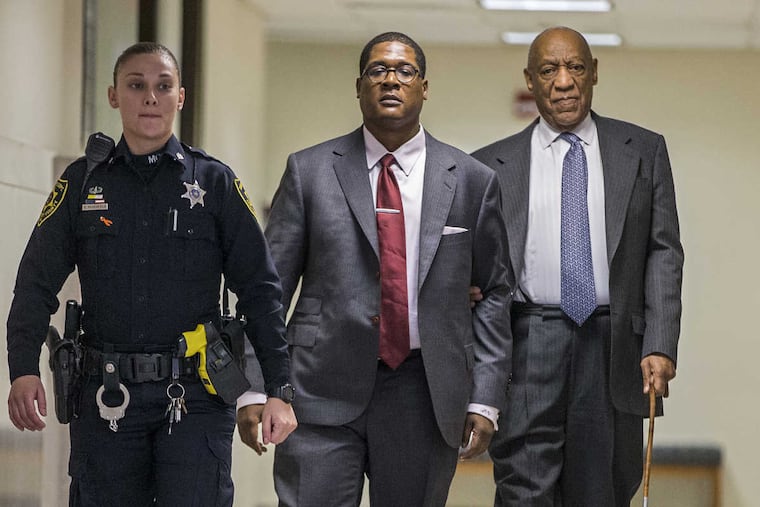Bill Cosby's payout to Andrea Constand will be revealed at trial, judge rules
The settlement agreement - kept confidential for more than a decade, including during Cosby's first trial, which ended with a hung jury in June - will be disclosed publicly for the first time. Seven jurors have been selected for the panel of 12 that will ultimately decide Cosby's fate.

It is a mystery that has persisted throughout years of Bill Cosby's legal travails: Just how much did he pay Andrea Constand to settle the sexual assault lawsuit she filed against him more than a decade ago?
The answer may finally be revealed to jurors in the 80-year-old entertainer's retrial this month, thanks to a ruling Tuesday from the judge presiding over the case.
Montgomery County Judge Steven T. O'Neill said he would allow Cosby's defense team to air details of that confidential settlement agreement in court – including the amount Constand was paid – as they aim to paint the 44-year-old Canadian massage therapist as a gold-digging opportunist who fabricated her allegations of abuse.
But prosecutors think the significant sum Cosby shelled out in 2006 works in their favor, too, showing just how desperate he was to buy Constand's silence.
The judge's order came amid a flurry of last-minute rulings Tuesday, as he and lawyers for both sides continued to select the jury that will hear Cosby's case starting next week.
The process was briefly derailed as defense lawyers accused prosecutors of systematically attempting to exclude older white men from the panel. O'Neill swiftly swatted down their concerns, and by the end of the day seven jurors had been chosen, leaving 11 seats to be filled.
They included a middle-aged black woman who told the judge that she or a close family member had been a victim of sexual assault, and a white man in his 30s with a past conviction for misdemeanor disorderly conduct, although he insisted that record wouldn't taint his views of Cosby's case.
Four men and three women have been selected so far. Two are African American, the others are white. All but one said they had prior knowledge of the allegations against Cosby — but each agreed they could set aside what they've heard.
"To be honest with you, I've heard about it," said one of the men picked Tuesday. "But I haven't paid much attention to it."
Unlike the jurors who were unable to reach a unanimous verdict during Cosby's last trial in June, those chosen this time will eventually be exposed to the full legal history between the Hollywood icon and one of the first women to publicly accuse him – a history that paved the way for the criminal charges Cosby faces today.
Constand sued Cosby in federal court in Philadelphia in 2005, after former District Attorney Bruce L. Castor Jr. declined to bring a case against the entertainer based on her claims that he had drugged and assaulted her the previous year.
Cosby's deposition in that suit – which included damning admissions regarding his relationship with Constand, his many affairs, and past drug use in consensual sexual encounters with women – formed the backbone of the criminal complaint that Castor's successor, Risa Vetri Ferman, eventually filed against Cosby in 2015.
And more than a decade ago, Constand's attorneys had gathered the first set of 13 "Jane Doe" witnesses – women who were prepared to testify that they, too, had been drugged and assaulted by Cosby, many of whom prosecutors in the criminal case have sought to call as witnesses in both trials.
But before the civil litigation could end up before a jury, both sides agreed in 2006 to a confidential settlement, the details of which have remained subject to a nondisclosure pact.
At Cosby's first criminal trial last year, prosecutors and Cosby's then-lawyers studiously avoided mentioning that settlement or even the lawsuit that produced it, fearing that aspects of the litigation could damage the cases that both sides were trying to present to the jury.
This time, though, Cosby's new defense team – led by California attorney Tom Mesereau – has shown no such concern, arguing that the details of the suit lie at the heart of the portrait they intend to paint of Constand in court.
O'Neill delivered two other significant victories to the defense Tuesday that could help Mesereau make that case.
Reversing a decision he made during the last trial, the judge said this time he is likely to allow testimony from a former coworker of Constand's who says the former Temple University women's basketball manager once boasted that she could concoct sexual assault claims against a celebrity in order to extort money.
The judge also barred prosecutors from discussing the negotiation process that led to the settlement of Constand's lawsuit.
Her civil lawyers have said that Cosby's team pushed hard during those debates to include a provision in the 2006 agreement that would have barred Constand from cooperating with any future law enforcement investigations – a move that Montgomery County District Attorney Kevin R. Steele has suggested is indicative of Cosby's guilt.
The judge's ruling didn't elaborate on the reasons he said that can't be introduced.
In other orders Tuesday, O'Neill barred lawyers from mentioning ongoing litigation between Constand and Castor over statements the ex-prosecutor made about her in the months before Cosby was charged.
The judge put off rulings on several other matters – including whether to admit Cosby's past testimony on obtaining Quaaludes to use in seducing women – saying he would resolve them shortly before or during the trial.
Jury selection is expected to continue Wednesday as O'Neill individually questions 12 prospective panel members selected from a larger group of 119 — more than two-thirds of whom said they already had formed an opinion of Cosby's guilt or innocence. Another group of 120 potential jurors has been summoned for Wednesday.
Opening arguments are scheduled to begin Monday.